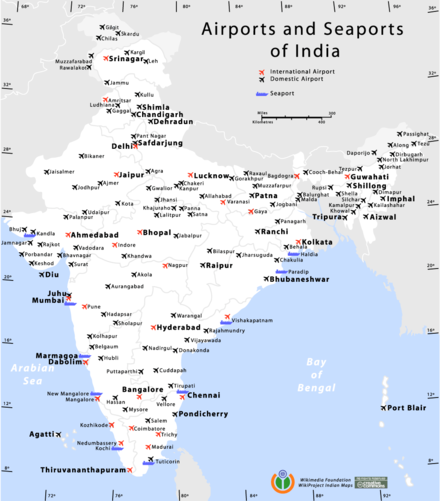
Alang is a census town in Bhavnagar district in the Indian state of Gujarat. In the past three decades, its beaches have become a major worldwide centre for ship breaking. The longest ship ever built, Seawise Giant, was sailed to and beached here for demolition in December 2009.

Ship-breaking or ship demolition is a type of ship disposal involving the breaking up of ships for either a source of parts, which can be sold for re-use, or for the extraction of raw materials, chiefly scrap. It may also be known as ship dismantling, ship cracking, or ship recycling. Modern ships have a lifespan of 25 to 30 years before corrosion, metal fatigue and a lack of parts render them uneconomical to operate. Ship-breaking allows the materials from the ship, especially steel, to be recycled and made into new products. This lowers the demand for mined iron ore and reduces energy use in the steelmaking process. Fixtures and other equipment on board the vessels can also be reused. While ship-breaking is sustainable, there are concerns about the use of poorer countries without stringent environmental legislation. It is also labour-intensive, and considered one of the world's most dangerous industries.

The Port of Hong Kong, located by the South China Sea, is a deepwater seaport dominated by trade in containerised manufactured products, and to a lesser extent raw materials and passengers. A key factor in the economic development of Hong Kong, the natural shelter and deep waters of Victoria Harbour provide ideal conditions for berthing and the handling of all types of vessels. It is one of the busiest ports in the world, in the three categories of shipping movements, cargo handled and passengers carried.

Jawaharlal Nehru Port, abbreviated as JNPT, also known as Nhava Sheva, is the largest container port in India. Located east of Mumbai in Navi Mumbai, Maharashtra, this port on the Arabian Sea is accessed via Thane Creek. Its common name derives from the names of Nhava and Sheva villages that were situated here. This port is also the terminal of Western Dedicated Freight Corridor.
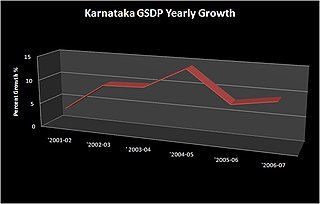
Karnataka is one of the highest economic growth states in India with an expected GSDP growth of 8.2% in the 2010-11 fiscal year. The total expected GSDP of Karnataka in 2010–2011 is about ₹2719.56 billion. Per capita GSDP during 2008–2009 was US$1034.9. Karnataka recorded the highest growth rates in terms of GDP and per capita GDP in the last decade compared to other states. In 2008–09, the tertiary sector contributed the most to GSDP, followed by the secondary sector, and the primary sector.
The Delhi–Mumbai Industrial Corridor Project (DMIC) is a planned industrial development project between India's capital, Delhi and its financial hub, Mumbai. The DMIC project was launched in pursuance of an MOU signed between the Government of India and the Government of Japan in December 2006. It is one of the world's largest infrastructure projects with an estimated investment of US$90 billion and is planned as a high-tech industrial zone spread across six states, as well as Delhi, the national capital and itself a Union Territory. The investments will be spread across the 1,500 km long Western Dedicated Freight Corridor which will serve as the industrial corridor's transportation backbone.

The Ministry of Shipping, a branch of the Government of India, is the apex body for formulation and administration of the rules and regulations and laws relating to shipping, headed by Shri Mansukh L. Mandaviya.
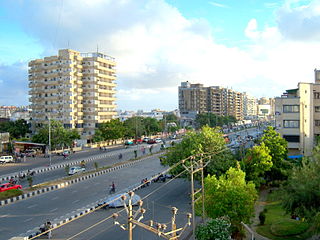
The economy of Gujarat, a state in Western India, has significant agricultural as well as industrial production within India. Major agricultural produce of the state includes cotton, groundnuts (peanuts), dates, sugar cane, milk and milk products. Industrial products include cement and petrol. Gujarat recorded the lowest unemployment rate in India in 2015, with 1.2% of the labour force being unemployed.
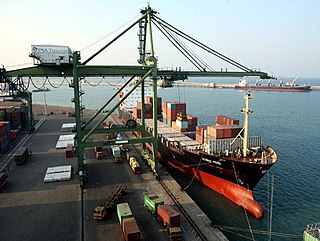
V. O. Chidambaranar Port Trust, formerly Tuticorin Port Trust, is one of the 12 major ports in India. It was declared to be a major port on 11 July 1974. It is second-largest port in Tamil Nadu and fourth-largest container terminal in India. After Sethusamudram Shipping Canal Project V. O. Chidambaranar Port Trust will be India's premier port and one of the major ports of Asia equal to Port of Singapore. V. O. Chidambaranar Port Trust is an artificial port. This is the third international port in Tamil Nadu and its second all-weather port. All V. O. Chidambaranar Port Trust's traffic handling has crossed 10 million tons from 1 April to 13 September 2008, registering a growth rate of 12.08 per cent, surpassing the corresponding previous year handling of 8.96 million tons. It has services to USA, China, Europe, Sri Lanka and Mediterranean countries. The Station Commander, Coast Guard Station Thoothukudi is located at V. O. Chidambaranar Port Trust,Tamil Nadu under the operational and administrative control of the Commander, Coast Guard Region (East), Chennai. The Coast Guard Station V. O. Chidambaranar Port Trust was commissioned on 25 Apr 1991 by Vice Admiral SW Lakhar, NM, VSM the then Director General Coast Guard. The Station Commander is responsible for Coast Guard operations in this area of jurisdiction in Gulf of Mannar. V. O. Chidambaranar Port Trust Thoothukudi is an ISO 9001:2008,ISO 14001:2004 and ISPS compliant Port.

The Scindia Steam Navigation Company was one of the oldest Indian shipping companies. Founded in 1919, envisioned by Walchand Hirachand, it was a joint venture of Walchand along with Narottam Morarjee, Kilachand Devchand and Lallubhai Samaldas all of them businessmen hailing from Gujarat. It played a significant role in Indian independence. It was the first large scale Indian owned shipping company and started an India — Europe service with the Loyalty, but was forced to sign a 10-year agreement with British companies and its shipping route was restricted to the Indian coastal shipping trade for this period.

Essar Group, founded by Shashi Ruia and Ravi Ruia, in 1969, as a construction company, later diversified into various core sectors, to become one of India's biggest multinational conglomerates.

Bharati Defence and Infrastructure Limited is one of the largest shipbuilding companies in India.
The Kattupalli Shipyard cum Captive Port Complex is a large shipyard project at Kattupalli village near Ennore in Chennai, being built by L&T Shipbuilding Ltd. It is being set up jointly by TIDCO and Larsen & Toubro (L&T) in two phases. L&T shipbuilding Kattupalli is a minor port. Adani ports and special economic zone (APSEZ) acquired kattupalli port from L&T in June 2018 and renamed it as Adani Katupalli Port Private Limited (AKPPL).
Reliance Naval and Engineering Limited (R-Naval), formerly known as Reliance Defence & Engineering Limited and prior to that as Pipavav Shipyard Limited and Pipavav Defence & Offshore Engineering Company Limited is an Indian shipbuilding and Heavy industry company headquartered in Mumbai. The shipyard is located in Pipavav, Gujarat, at a distance of 90 km South of Amreli, 15 km South of Rajula and 140 km South West of Bhavnagar. R-Naval is the first private sector company in India to obtain the licence and contract to build warships.
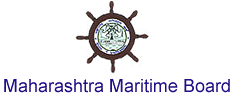
The Maharashtra Maritime Board is governmental organisation in the state of Maharashtra, India. The board is tasked with the administration of ports and harbours, conservancy, licensing of crafts, levying of fees, regulation and control of traffic. Maharashtra Maritime Board (MMB) came into existence in 1996 and Commissioner, Water Transport was re-designated as chief executive officer, MMB.

Mundra Port is the largest private port of India located on the north shores of the Gulf of Kutch near Mundra, Kutch district, Gujarat. Formerly it was operated by Mundra Port and Special Economic Zone Limited (MPSEZ) owned by Adani Group which later it was expanded into Adani Ports & SEZ Limited (APSEZ) managing several ports.
Maharashtra is a state in the western region of India. It is the second most populous state and third largest state by area in India. Maharashtra is bordered by the Arabian Sea to the west, Gujarat and the Union territory of Dadra and Nagar Haveli to the northwest, Madhya Pradesh to the north and northeast, Chhattisgarh to the east, Karnataka to the south, Telangana to the southeast and Goa to the southwest. The state covers an area of 307,731 km2 (118,816 sq mi) or 9.84% of the total geographical area of India.
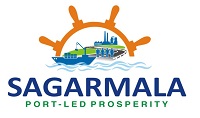
The Sagarmala Programme is an initiative by the government of India to enhance the performance of the country's logistics sector. The programme envisages unlocking the potential of waterways and the coastline to minimize infrastructural investments required to meet these targets. It entails investing ₹8.5 trillion (2018) to set up new mega ports, modernizing India's existing ports, developing of 14 Coastal Economic Zones (CEZs) and Coastal Employment Units, enhancing port connectivity via road, rail, multi-modal logistics parks, pipelines & waterways and promoting coastal community development, with the aim of boosting merchandise exports by US$110 billion and generating around 10,000,000 direct and indirect jobs. The Sagarmala Programme is the flagship programme of the Ministry of Shipping to promote port-led development in the country by exploiting India’s 7,500 km long coastline, 14,500 km of potentially navigable waterways and its strategic location on key international maritime trade routes. Sagarmala aims to modernize India's Ports so that port-led development can be augmented and coastlines can be developed to contribute to India's growth. It also aims at "transforming the existing Ports into modern world-class Ports and integrate the development of the Ports, the Industrial clusters and hinterland and efficient evacuation systems through road, rail, inland and coastal waterways resulting in Ports becoming the drivers of economic activity in coastal areas."
The National Shipping Board is an Advisory Body on matters related to shipping and shipping infrastructure(ports) .As India gained its independence in 1947 shipping had become very important for the growth of India as the Shipping Laws were created by old British law it had to be revised and in 1958 when the Merchant Shipping Law was consolidated and the opportunity was taken to provide for the formation of a Permanent statutory body called the National Shipping Board. The National Shipping Board was established on 1 March 1959.The Body was established by a recommendation to the Reconstruction Policy Sub-Committee as early as 1947. It comes under the Ministry of Shipping (India)it looks into matters related to Indian Shipping.The National Shipping Board members are elected/nominated by Parliament, Lok Sabha (lower house of parliament and Rajya Sabha. The National Maritime Agenda 2010-2020 is an initiative of the Ministry of Shipping & The National Shipping Board to outline the framework for the development of the port sector. The agenda also suggests policy-related initiatives to improve the operating efficiency and competitiveness of the Ports in India.
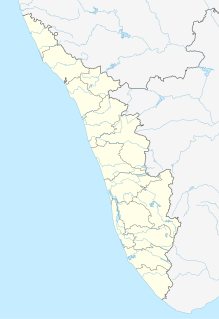
Kerala has one major port, 12 minor ports and 2 intermediate ports. Kerala has a coastline of around 590 km.
